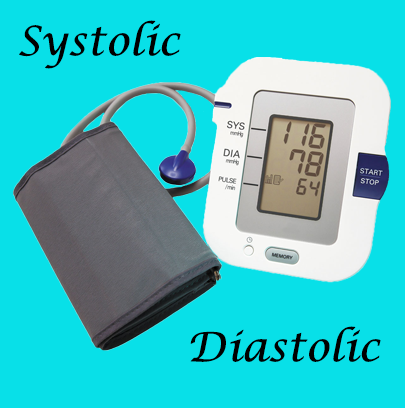
Blood pressure is the result of your blood moving from your heart to the rest of your body.
The systolic number is when your heart is actually pumping the blood to the body and how much pressure it applies to the artery wall as it is pumping.
The diastolic number is how much pressure is pushed against your artery walls when the heart is between pumps (beats).
Everyone gets high blood pressure when under stress, excited, nervous, etc., However, short moments of elevated blood pressure is nothing to worry about, but when your blood pressure is sustained at an above normal rate you are suffering from hypertension and you are almost guaranteed to have a stroke or heart attack or both if your body stays in a hypertensive state for a prolonged period of time.
Clogged arteries and harden artery walls are great contributors to hypertensive blood pressure. The common contributors to this scenario are drinking too much alcohol, smoking, being overweight, excessive amounts of sodium (salt), and of course the one thing you cannot avoid, getting older. If your family genetics predisposes you for hypertension you need to be extra cautious and start young developing good habits to prevent or delay becoming hypertensive.
Resources:
Kaiser Permanente, Health & Wellness, High Blood Pressure Condition Basics, Healthwise Staff, June 24, 2023
https://healthy.kaiserpermanente.org/southern-california/health-wellness/health-ncyclopedia/he.hw62787#acn1360
Last viewed: 20240119
Cleveland Clinic, Health Library, Diagnostics & Testing, Blood Pressure, Last reviewed by Cleveland Clinic Medical Professional, July 1, 2022
https://my.clevelandclinic.org/health/diagnostics/17649-blood-pressure
Last viewed: 20240119
Mayo Clinic, Blood Pressure Chart: What Your Reading Means, By Mayo Clinic Staff, March 18, 2022,
https://www.mayoclinic.org/diseases-conditions/high-blood-pressure/in-depth/blood-pressure/art-20050982
Last viewed: 20240119
